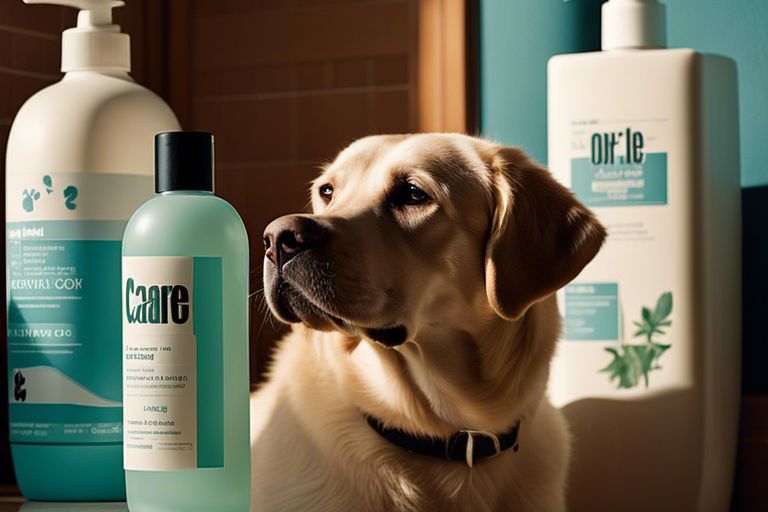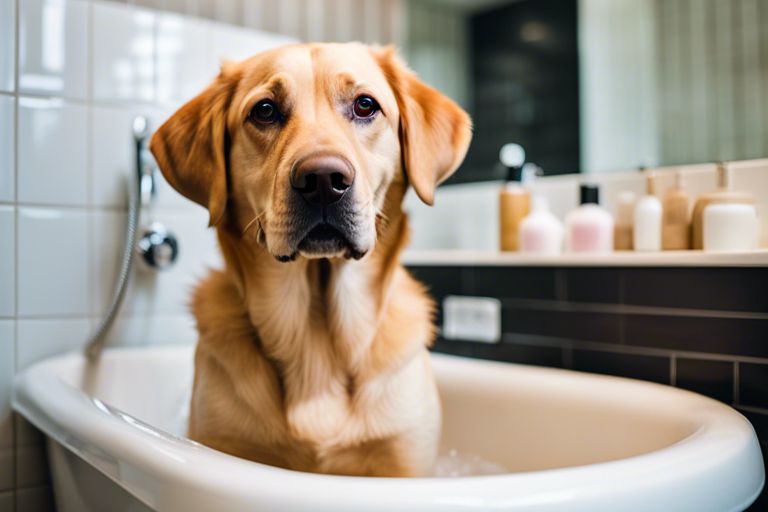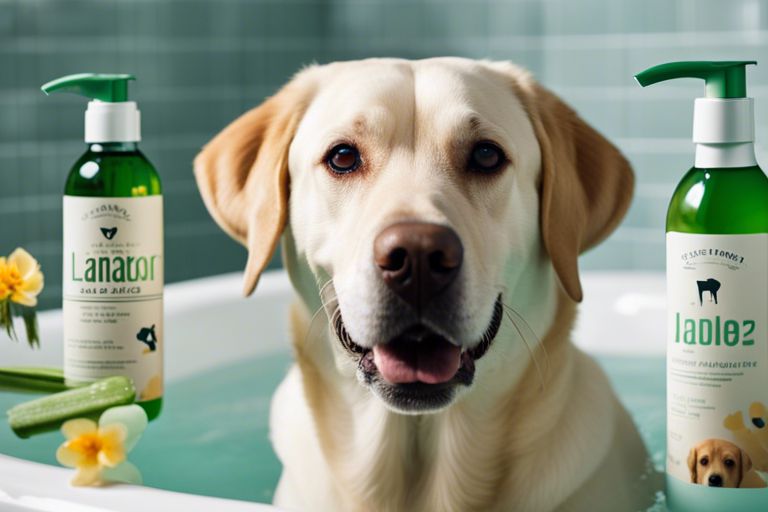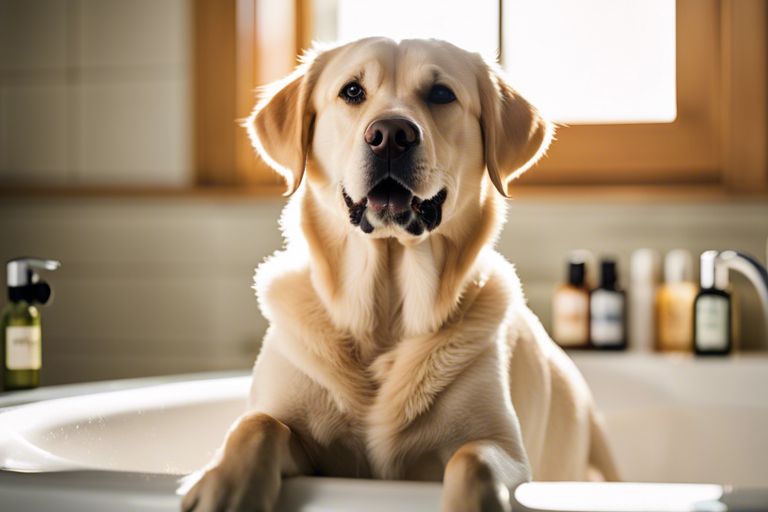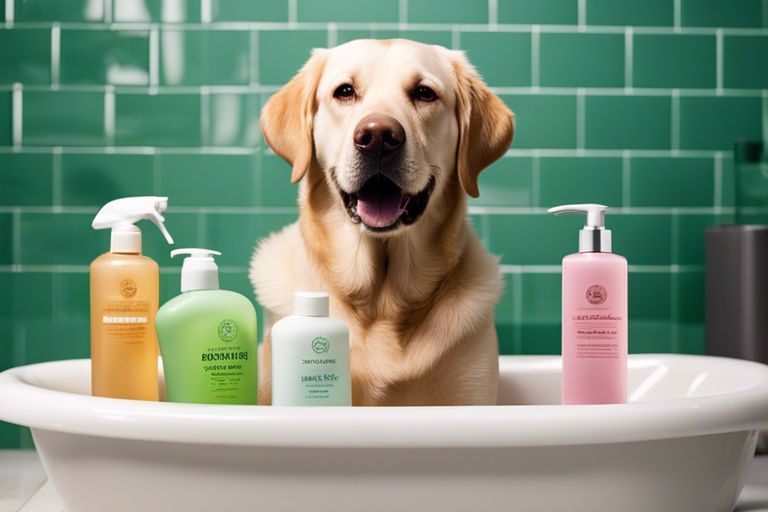Welcome to our latest guide on caring for your furry friend! As devoted pet parents, we always strive to provide the best grooming products for our beloved Labradors. However, it’s important to be aware of the potential signs that indicate a negative reaction to their dog shampoo. By understanding these signs, we can ensure our furry friends remain happy and healthy. For additional information on allergic reactions in dogs, check out this helpful blog post on 7 Signs of an Allergic Reaction in Dogs.
From skin irritations to unusual behaviors, recognizing the signs of a bad reaction to dog shampoo is crucial for the well-being of our Labradors. In this comprehensive guide, we’ll walk you through the key indicators to look out for, as well as provide tips on how to choose the best dog shampoo for your furry companion. Let’s ensure that bath time is an enjoyable and safe experience for your Labrador!
Key Takeaways:
- Excessive itching or scratching: If your Labrador is constantly itching or scratching after a bath, it could be a sign that the dog shampoo is irritating their skin.
- Red or inflamed skin: Check your dog’s skin for any redness or inflammation, which can indicate an allergic reaction to the shampoo.
- Excessive shedding: If your Labrador is shedding more than usual after a bath, it could be a sign of a negative reaction to the shampoo.
- Behavior changes: Keep an eye out for any unusual behavior in your Labrador after a bath, such as excessive licking, pacing, or restlessness.
- Strong odor: If your dog’s coat has a strong, unpleasant odor after a bath, it could be a sign that the shampoo is not agreeing with their skin.
- Excessive dryness or oiliness: If your Labrador’s skin and coat seem excessively dry or oily after a bath, it may be a reaction to the shampoo ingredients.
- Vomiting or diarrhea: In extreme cases, a negative reaction to the shampoo may manifest as digestive issues such as vomiting or diarrhea.
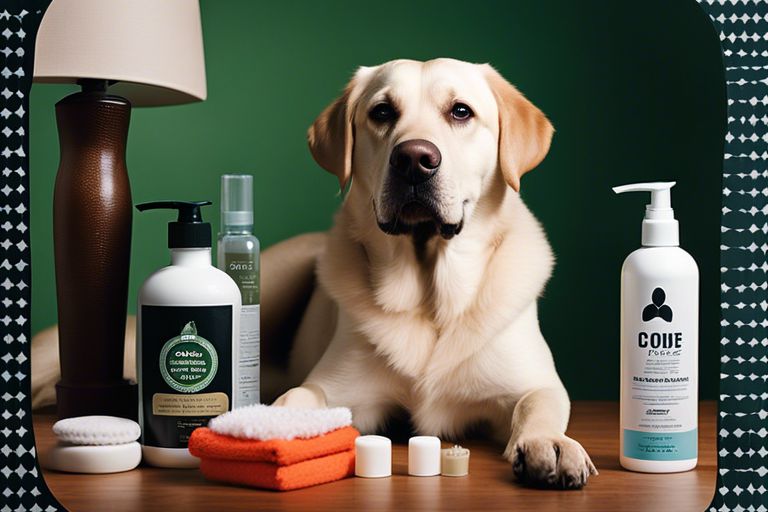
Recognizing the Signs of a Bad Reaction
Even the most well-intentioned pet owners may not realize that their Labrador is having a bad reaction to their dog shampoo. It’s important to be able to recognize the signs so that you can make the necessary adjustments to keep your furry friend happy and healthy.
Physical Symptoms to Watch For
Recognizing physical symptoms of a bad reaction to dog shampoo is crucial for your Labrador’s well-being. Watch out for signs such as redness or irritation of the skin, excessive scratching or licking, dry or flaky skin, and changes in their coat’s texture. If you notice any of these symptoms, it may be time to switch to a different shampoo to avoid further discomfort for your furry friend.
Behavioral Changes That May Indicate Discomfort
On top of physical symptoms, pay attention to any behavioral changes that may indicate discomfort in your Labrador. This can include increased agitation during bath time, avoiding certain areas of the house or yard, excessive panting, or changes in their sleep patterns.The well-being of your pet is important, so it’s crucial to recognize these signs and take action to address any issues they may be experiencing.
The happiness and comfort of your Labrador are paramount, so it’s essential to pay attention to any signs of discomfort and act accordingly. By recognizing these signs early on, you can ensure that your furry friend stays happy and healthy.
Types of Dog Shampoo Ingredients That Can Cause Reactions
The ingredients in your dog’s shampoo can play a big role in how their skin and coat react. Here are some common types of dog shampoo ingredients that can cause reactions:
| 1. Artificial fragrances | 2. Harsh chemicals such as sulfates |
| 3. Parabens | 4. Alcohol |
| 5. Artificial colors | 6. Preservatives |
Perceiving any of these ingredients on the label of your dog’s shampoo could be a sign that it may not be the best choice for your Labrador.
Common Irritants in Dog Shampoos
An important thing to look out for is the common irritants found in many dog shampoos. Ingredients such as artificial fragrances, parabens, and artificial colors can often lead to skin irritation and allergic reactions in dogs. If you notice any of these ingredients listed on your dog’s shampoo bottle, it may be a good idea to consider switching to a gentler option.
Hypoallergenic Options for Sensitive Skin
Sensitive skin can be a common issue for Labradors, so it’s important to choose a shampoo that is hypoallergenic and formulated specifically for sensitive skin. Look for options that are free from harsh chemicals, artificial fragrances, and other potential irritants. Plus, consider shampoos that contain soothing ingredients such as oatmeal or aloe vera to help calm any existing skin irritation.
Factors to Consider When Selecting a Dog Shampoo
Keep in mind these important factors when choosing the right dog shampoo for your furry friend:
- Ingredients and allergens
- Coat type and skin condition
- Fragrance and essential oils
- Effectiveness and purpose (e.g., flea treatment, conditioning)
After considering these factors, you can make an informed decision about which dog shampoo will be best for your Labrador.
Your Labrador’s Age and Health Status
Status of your Labrador’s age and health are crucial factors to consider when selecting a dog shampoo. A young, healthy Labrador may tolerate a fragranced shampoo with ease, while an older dog with sensitive skin may require a gentler, hypoallergenic formula.
Environmental and Lifestyle Considerations
Factors like your Labrador’s living environment and daily activities play a significant role in which dog shampoo will be most suitable. Environmental factors, such as exposure to dirt and allergens, can impact the type of shampoo you choose. Likewise, your Labrador’s lifestyle, including their level of outdoor activity and exposure to water, will influence the effectiveness and purpose of the shampoo you select.
The right shampoo will help maintain your Labrador’s healthy coat and skin, ensuring they stay clean and comfortable while enjoying their active lifestyle.
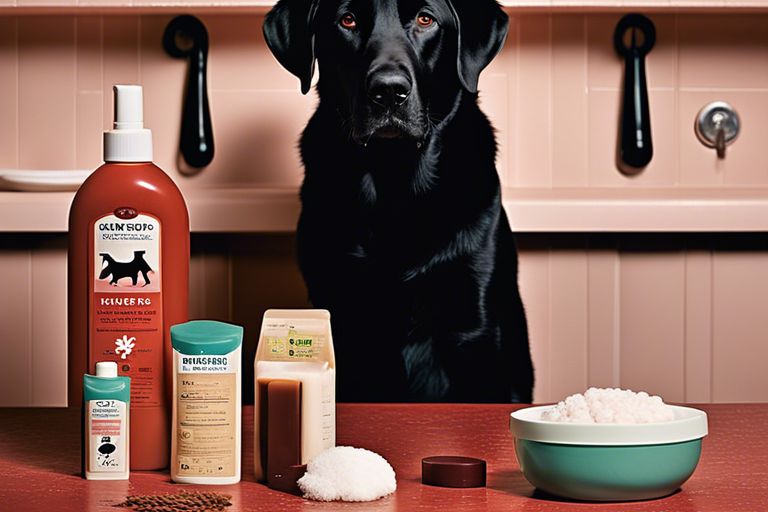
Step-by-Step Guide to Safely Bathe Your Labrador
After giving your Labrador a bath, it’s important to make sure you are doing it safely and effectively. Follow this step-by-step guide to ensure a successful and stress-free bathing experience for both you and your furry friend.
| Pre-Bath Tips for a Stress-Free Experience | How to Properly Apply and Rinse Shampoo |
|
On the day of the bath, take your Labrador for a walk or engage in some form of exercise to help them relax and release some energy. This will make them calmer and more cooperative during the bathing process. Knowing that the bath is coming, try not to make a big deal out of it so your dog doesn’t get anxious.
|
Experience with your Labrador and their shampoo is key. Start by wetting their coat thoroughly with warm water. With their hair wet, apply a small amount of dog shampoo and massage it into their coat, focusing on areas where dirt and odor tend to accumulate. Rinse their coat completely, making sure to get rid of all the suds. |
With the right approach and plenty of patience, you can make bath time a positive experience for your Labrador. By following these steps, your furry friend will come out of the bath feeling and smelling great, and you will have peace of mind knowing that you have safely and effectively bathed your Labrador.
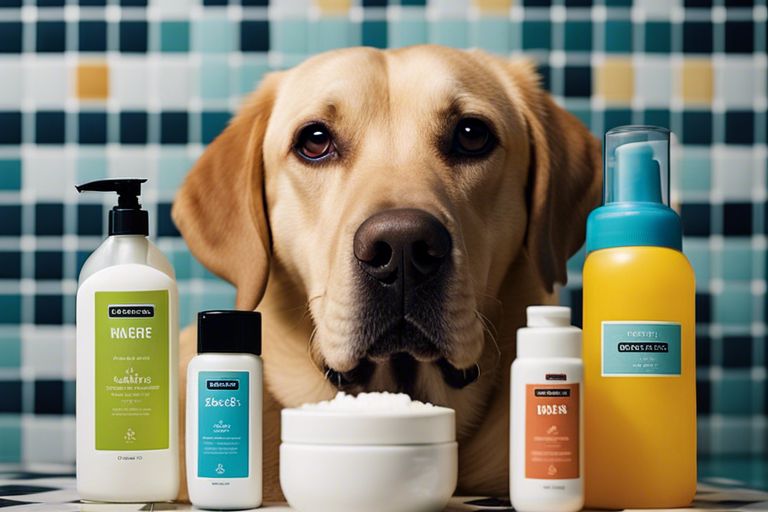
Tips for Monitoring Your Dog’s Reaction After Bathing
Noticing your Labrador’s reaction after a bath is important in ensuring their happiness and health. Here are some tips for monitoring their reaction after bathing:
- Monitor their skin for any signs of irritation or redness
- Observe their behavior for signs of discomfort or itchiness
- Keep an eye on their coat for any changes in texture or appearance
After bathing, take the time to carefully observe your Labrador for any signs of discomfort or reaction to their dog shampoo.
What to Do Immediately After Bathing
After bathing your Labrador, thoroughly rinse off all the shampoo to ensure no residue is left on their skin. Pat them dry with a clean towel and pay attention to any signs of irritation or discomfort. If you notice any redness or itching, consult your veterinarian immediately for further advice.
Long-Term Monitoring Strategies
Any changes in your Labrador’s skin or coat should be noted and monitored over time. With regular baths, it’s important to keep track of any recurring reactions to different shampoos. Look for patterns in their behavior and skin condition and consider changing to a more gentle or hypoallergenic shampoo if necessary.
informative, and helpful.
The Pros and Cons of Natural vs. Chemical-Based Shampoos
Now, let’s explore the benefits and drawbacks of natural and chemical-based shampoos. It’s important to understand the differences between these two types of products in order to make an informed decision for your Labrador’s grooming routine.
| Natural Ingredients | Chemical-Based Shampoos |
| Gentle and non-toxic | Potentially harsh on the skin |
| Environmentally friendly | May contain artificial fragrances and dyes |
| Safe for sensitive skin | Effective for treating specific skin issues |
Benefits and Drawbacks of Natural Ingredients
An important consideration when choosing a dog shampoo is the use of natural ingredients. Natural shampoos are often gentle and non-toxic, making them a great choice for Labradors with sensitive skin. Additionally, these products are environmentally friendly, reducing the impact on our planet. However, natural shampoos may not be as effective for treating specific skin issues and may lack the artificial fragrances and dyes that some pet owners prefer for a fresh-smelling coat.
Evaluating the Safety and Efficiency of Chemical-Based Shampoos
Natural shampoos are not the only option available for your Labrador. Chemical-based shampoos can be effective for treating specific skin issues and providing a fresh-smelling coat. However, it’s important to consider whether these products may be potentially harsh on your dog’s skin and whether they contain artificial fragrances and dyes that could cause irritation.
Any dog shampoo you choose should be safe and suitable for your Labrador’s specific needs, whether natural or chemical-based. It’s important to consider your dog’s individual skin sensitivities and grooming requirements when selecting the right product for their bathing routine.
Conclusion
Ultimately, it’s important to pay attention to your Labrador’s behavior after giving them a bath with a new shampoo. Look for signs such as itching, redness, dry skin, or excessive scratching, as these could be indications that your dog is reacting badly to the shampoo. If you notice any of these signs, it’s best to discontinue use of the shampoo and consult with your veterinarian for guidance. It’s always better to be cautious when it comes to your pet’s health and well-being.
Remember that every dog is different, and what works for one may not work for another. In some cases, it may take a few uses before a reaction becomes apparent. Be patient and observant, and make adjustments as needed to ensure your Labrador’s bathing experience is as comfortable and safe as possible. By being attuned to your dog’s reactions, you can ensure that bath time is a positive experience for both you and your furry friend.
FAQ
Q: What are the signs that my Labrador might be reacting badly to their dog shampoo?
A: Common signs of a shampoo reaction in Labradors include itching, redness, irritation, flakiness, or a rash on their skin. They may also exhibit excessive scratching or licking.
Q: How can I tell if my Labrador is having an adverse reaction to their dog shampoo?
A: If you notice any of the symptoms mentioned earlier, discontinue the use of the shampoo immediately. Wash your dog with warm water to remove any remaining product and consult a veterinarian for further guidance.
Q: Are there particular ingredients in dog shampoos that Labradors are more likely to react to?
A: Labradors, like many other dogs, may be sensitive to fragrances, dyes, or harsh chemicals commonly found in shampoos. Look for hypoallergenic or natural shampoos specifically formulated for sensitive skin.
Q: Can I prevent my Labrador from reacting badly to their dog shampoo?
A: Performing a patch test before using a new shampoo on your Labrador is a good practice. Apply a small amount of the product on a small area of their skin and monitor for any adverse reactions over the next 24 hours before proceeding with a full bath.
Q: What should I do if my Labrador has a severe reaction to their dog shampoo?
A: If your Labrador experiences a severe reaction such as swelling, hives, or difficulty breathing, seek immediate veterinary care. Be prepared to provide the product information and details of when the shampoo was used.
